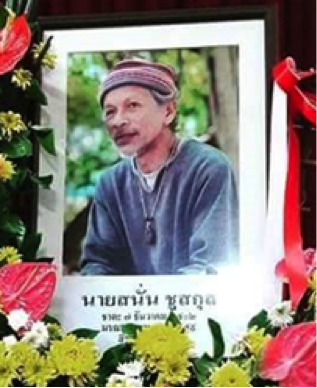
Sanan Chusakul, 1959-2016.
SURIN – Sanan Chusakul devoted his life to activism in the Northeast and his work revolved around the Mun River and the wetlands flooded by the Rasi Salai Dam in Si Sa Ket province. Mr. Sanan died from cancer last Wednesday. He was 56.
Thousands of activists, villagers, students, and government officials attended the cremation of Mr. Sanan, a long-time social and political activist, in Surin’s Muang District on Sunday.
Since the mid-1990s, Mr. Sanan was an advisor to the Assembly of the Poor and helped the movement to become the leading voice of poor people’s issues. He served as director of the Tham-Mun Project since its inception in 1996.
An accomplished author, he wrote several fiction and non-fiction books about the Northeast, despite being born and raised in Nakhon Si Thammarat in the South. Many Northeasterners accept him as an Isaan writer because of his dedication to the region.
At his cremation ceremony, mourners said they celebrated his humility, his wisdom, and his steadfast commitment to the people’s movement.
Sangkhom Jaroensap, 59, formerly on the board of the Community Organization Development Institute, said that Mr. Sanan had played a leading role in the fight to recognize community forests, and to seek justice for the communities that depended on the wetlands affected by the construction of the Rasi Salai Dam. He contributed significantly to Thai society’s understanding of the importance of wetland ecology.
“The loss of Sanan can be held as the loss of a major force” in the lower Isaan region, said Mr. Sangkhom.
Jamnong Jitnirat, 56, an activist based in Ubon Ratchathani province and an advisor to grassroots’ people movement P-Move, said “The movement has lost a major force.” Mr. Sanan recognized that the struggle for community rights had to be carried out with a deep understanding of basic community economies, people’s livelihoods, and social welfare.
Kovit Boonjear, a Khon Kaen-based activist, recalls that Mr. Sanan devised a simple but effective way to organize twelve disparate groups living on the edges of the wetlands in Si Sa Ket province. He succeeded in uniting the groups with a 1-baht-per-day savings scheme that created a single group through which demands could be made of the government. The saving scheme also provided a fund, which could sustain the struggle and provide social welfare.
Mr. Kovit said that Mr. Sanan possessed rare personal qualities that enabled him to work effectively with any group. He was humble and a careful listener who cultivated good relations with villagers and government officials alike. Over the years, he was also a mentor and teacher to hundreds of students, Mr. Kovit added.
Mr. Sanan was also adept at using research as a way to strengthen community movements and formulate their demands. Ubon Youwah, who works with the Alternative Agriculture Network of the Northeast in Yasothon, said that Mr. Sanan had been a leading advocate amongst NGOs for researching local conditions, quality of life improvements, and community rights.
“Sanan was a true idealist of this world, both in the way he lived and the way he worked,” said Mr. Ubon. He was “a visionary, a thinker, a writer, an organizer.”
Somkiat Ponpai, the current head of the Assembly of the Poor, remarked that Mr. Sanan was a “wise and patient person” who sacrificed so much of himself that he neglected his own health. Mr. Somkiat, 65, a native of Khong Jiam District of Ubon Ratchathani, expressed concerns that Mr. Sanan’s work would not continue because he “was a major pillar of NGOs throughout the country.”
An advisor to the NGO Coordinating Committee on Rural Development, Decha Premrudelert of Khon Kaen, called Mr. Sanan “brave and conciliatory” in his approach to mobilizing people’s movements. He praised Mr. Sanan’s ability to pass on his knowledge to the new generation of activists. Mr Sanan’s approach was holistic, combining issues of health and literature, and there are many younger activists who now share the very same approach.
Mr. Sanan’s untimely death comes as a blow to the NGO and people’s movement, and was compared to that of Wanida Tantiwittayapitak, a mainstay of the movement, whose death in 2007, also from cancer, seemed for many as the end of an era.




